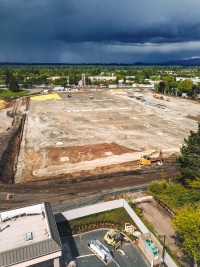PORTLAND, Oregon, June 24, 2024 – Two months after the Land Use Board of Appeals (LUBA) ruled in their favor and denied a motion to dismiss the original appeal, filed in December, 1000 Friends of Oregon, Neighbors for Clean Air, and Northwest Environmental Defense Center filed a petition today with LUBA seeking review of the City of Portland’s decision to issue building permits for the controversial Prologis freight warehouse slated for operation on the former Kmart site at NE 122nd and Sandy in Portland. The site directly abuts apartment buildings and is within walking and rolling distance of multiple schools, including Parkrose High School, Parkrose Middle School, and Shaver Elementary School. The petitioners are represented by the nonprofit Crag Law Center.

courtesy Argay Terrace Neighborhood Association.
The building site borders the Argay Terrace and Parkrose communities, two of the most racially and ethnically diverse areas of Portland. The current design plan would introduce 37 freight truck bays into this residential area, adding hundreds of daily trips along multiple high-crash corridors where numerous injuries and fatalities have been documented in recent years. Neighbors remark of regular incidents of cars running red lights and speeding, including an incident just last week, when a vehicle took out two power lines at NE 122nd and Shaver, causing power outages across the Parkrose neighborhood.
In filing the petition, advocacy groups believe that LUBA’s rulings to date, particularly denying the Motion to Dismiss the original appeal, issued in April, give the community the first real opportunity to present its full case and merits behind challenging the City of Portland decision to issue the permits. Advocates also welcome the opportunity this will give them to evaluate the full record that went into that decision. Concerns from the community have consistently focused on the fact that the city approved the permits without conducting impact analyses or addressing community concerns regarding safety, health, and quality-of-life impacts with meaningful and enforceable protections. The city has rejected even the most obvious requests, like formally designating the stretch of 122nd where the students cross as a school zone or installing adequate traffic-safety measures at the crosswalks.
In 2018, the City of Portland changed the site’s zoning from Commercial to General Employment, leaving open the possibility for a wide range of activities on the site. Today’s challenge to the building permits reflects the community’s frustration following attempts to shape the future of the site, which have been repeatedly rebuffed by city officials. This newest legal challenge is one of many notable developments at the high-profile site – including a catastrophic fire in July, which led to a class-action lawsuit against Prologis and the property’s owner.
The legal challenge follows numerous attempts since fall 2022 to work in good faith with the City of Portland to support the surrounding communities’ vision for this space. Freight warehouses pose dangers for the nearby residents and students, and bring pollution and environmental and social justice effects on communities, all of which have been well-documented and presented to the city.
“This neighborhood already has dangerous air quality mostly associated with diesel-burning trucks and equipment, and some of the hottest temperatures recorded in the last two heat dome events. Students, families, and people living in the surrounding neighborhoods have repeatedly asked the city to properly investigate how the development of this distribution center will impact their health and safety, as it potentially will add more diesel emissions and more heat-absorbing concrete. NCA believes the city has the ability to provide a full impact assessment, and the community deserves to know,” said Mary Peveto, co-director for Neighbors for Clean Air.
“The addition of 1,600 daily truck trips to an existing high-crash corridor – without any meaningful off-site impacts analysis – is a glaring oversight,” added Mary Stites, staff attorney at Northwest Environmental Defense Center. “Not only does the city code allow for this kind of analysis, but Chapter 33.262 of the code is a pillar of Portland’s environmental-justice and equity initiatives. Ignoring years of community calls to do off-site impacts analysis has denied the city the opportunity to signal to its communities that it wants to prioritize Portland residents’ health, safety, and well-being.”
“The city has repeatedly failed to ensure off-site impacts would be addressed before issuing the permits," said Annette Stanhope, chair of the Historic Parkrose Neighborhood Association. “For over two years, our concerns about the negative impacts from the Prologis development, including diesel truck pollution and increased semi-truck traffic near our students' schools, still have not been evaluated and addressed; LUBA is our last opportunity to have the community’s voice heard before this facility is completed.”
“For over a year, thousands of Oregonians have raised the very real dangers and hazards that will come if a warehouse distribution center is placed near people's schools and homes. I am disappointed that, instead of addressing these issues, we must resort to an appeal,” said Sam Diaz, executive director of 1000 Friends of Oregon.
“One of the guiding principles of the City of Portland’s 2035 Comprehensive Plan, which regulates development like this warehouse, is to ‘promote equity and environmental justice.’ However, the city has continuously missed opportunities to utilize its own comprehensive plan and codes to achieve this principle,” said Rebeka Dawit, Crag Law Center attorney who represents the groups. She continued, “This case is about holding the city accountable to its own environmental-justice commitments.
Despite moving forward with litigation, the groups filing the challenge believe that solutions are still possible. Neighbors have expressed interest in supporting local efforts to tap into federal funding, like the CHIPS and Science Act funding, to offer programming that prepares the next generation for work through accelerated education, training, and hands-on skill application in growing career fields.
---
Media contacts
Rebeka Dawit, Crag Law Center: rebeka@crag.org
Sam Diaz, 1000 Friends of Oregon: sam@friends.org | (503) 694-3892
Mary Peveto, Neighbors for Clean Air: mary@neighborsforcleanair.org | (503) 705-0481
Mary Stites, Northwest Environmental Defense Center: mary@nedc.org | (503) 768-6747
###
Resources: Petition
